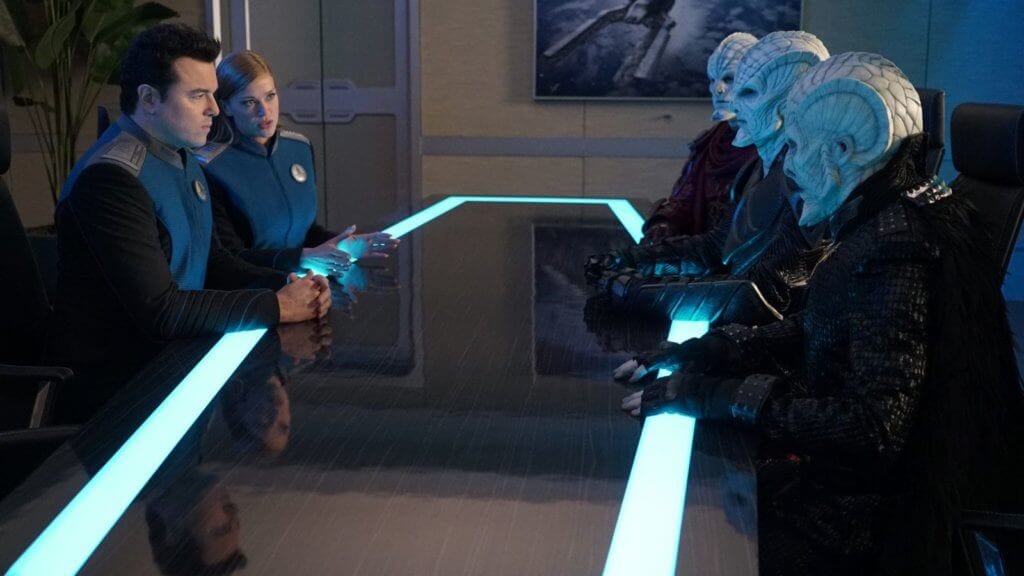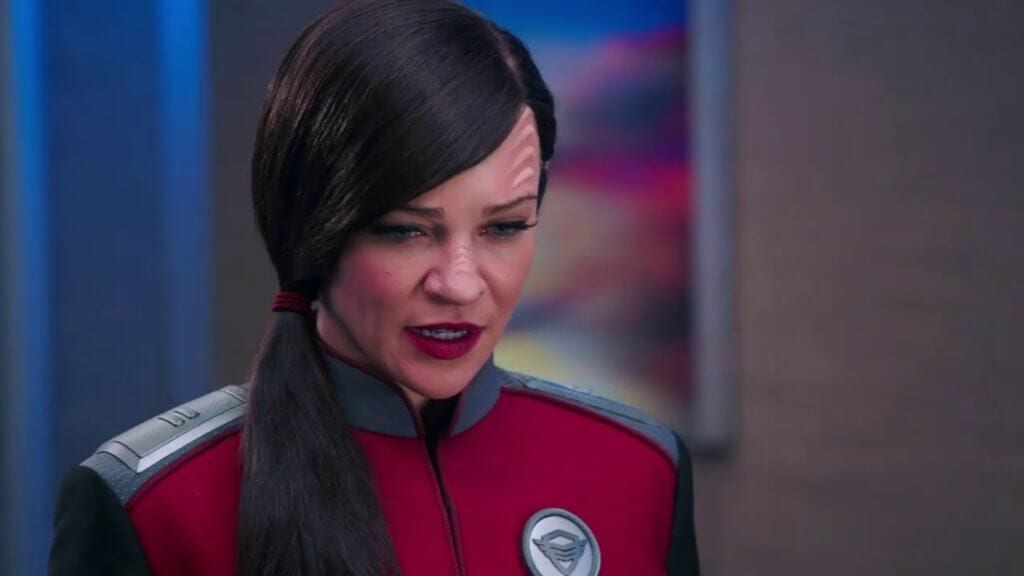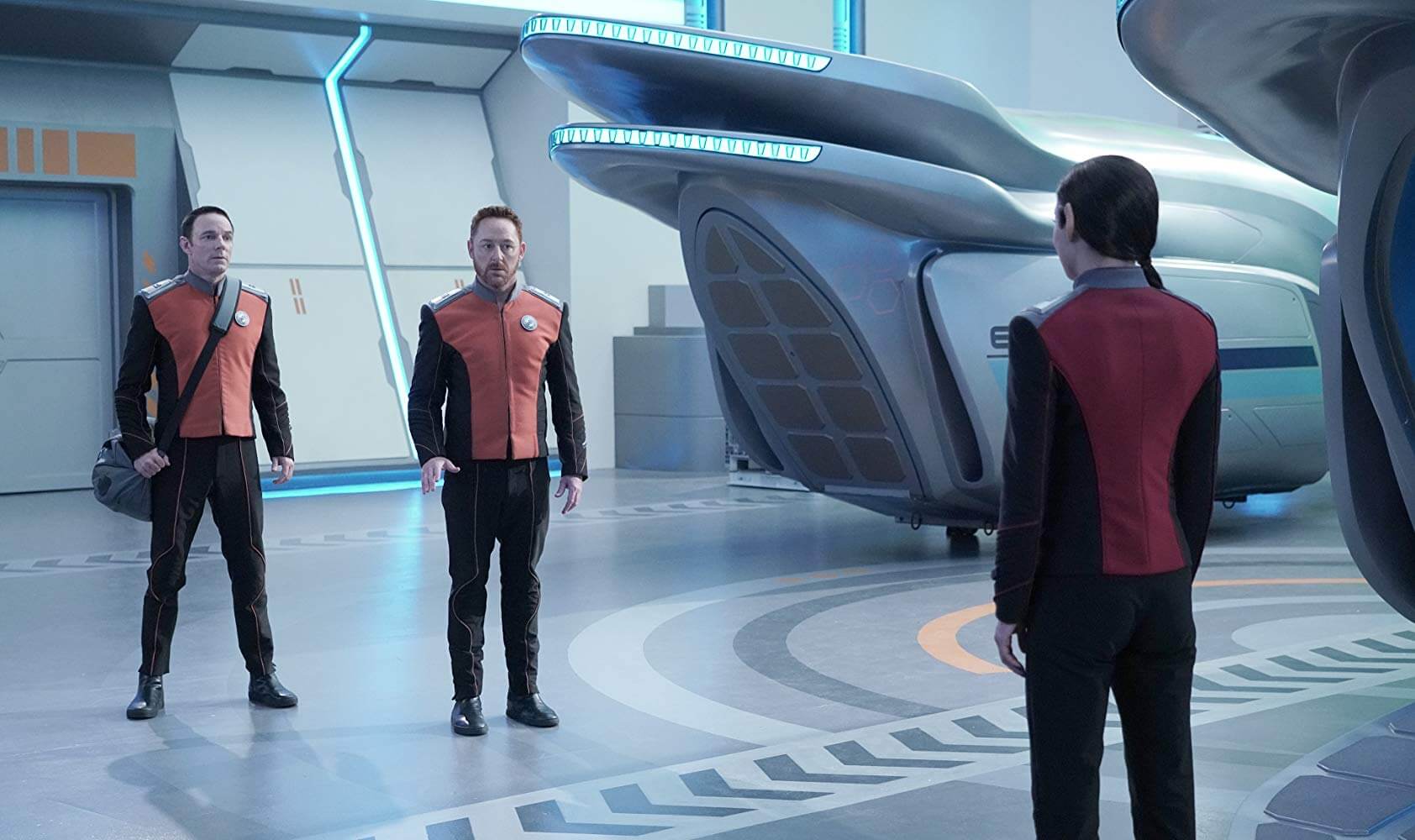REVIEW: The Orville – Season 2, Episode 10 “Blood of Patriots”
The Orville wasted no time exploring some of the new threads opened by last week’s incredible episode with “Blood of Patriots,” a mystery that sheds some light on Gordon’s past and puts a potential peace between warring systems in a new light. It’s also funny, exciting, and the most important episode yet for Tala.
The Orville crew is assigned the task of beginning peace talks with the Krill following their assistance in defeating the Kaylons, but a fugitive could end the accords before they start. Ed is once again caught between the greater and immediate goods. Gordon reunites with an old friend.
One of the most commendable things about “Blood of Patriots,” and The Orville on the whole, is that it moves quickly in exploring a possible peace with the Krill while taking only preliminary steps, making it clear that something this monumental is complicated and will take time. The talks at the heart of “Blood of Patriots” won’t end in a full alliance, or even peace, but in the signing of what the Krill call a Lak’vai Pact, indicating that “both parties will approach the table in good faith,” according to Ted Danson. Moreover, the reasons why Ed is chosen for the job indicate the long, arduous road to this point: the undercover mission from “Krill” ended in the destruction of a Krill ship, and Ed’s relationship with Teleya is the result of having a spy in their midst. Before the team-up against the Kaylons, every interaction with the Krill has been fraught with death and deception, with no love lost on either side (except maybe a small part of Ed). That sentiment makes someone like Ed marvel at how far they’ve come in a relatively short time, but it also pours salt on the open wounds of those who have suffered at the Krill’s hands, and the impasse this creates is what makes “Blood of Patriots” such a great episode.
*SPOILERS*
Through Orrin, Gordon’s oldest friend, “Blood of Patriots” examines the effects of peace on the victims of war. Orrin lost his wife and (we later discover) his daughter to the Krill, and he spent twenty years in one of their brutal prisons. When he finally manages to escape, he learns that the Union is about to strike up a peace with the fanatics who destroyed every single aspect of his life. Orrin is a Union officer, meaning he devoted himself to the organization, and he gave them everything; now, they’re throwing him and his dead family under the bus. There is a point where a man can’t be asked to sacrifice any more, and Orrin has reached his. The other side of the coin is that Orrin, in joining the Union, dedicated himself to peace, which is the Union’s ultimate goal; in that light, his wife and daughter can be seen to have given their lives for that cause. Making peace with the Krill and ending the bloodshed is a way of honoring them. At the same time, the final required concession to get the Krill to the table is for the Orville to surrender Orrin to them for interrogation and, likely, death, something the admirals are considering.
Caught in the middle are Ed and Gordon. Ed is a proponent of a peace treaty, and he’s a true believer in the Union’s ideals, working towards a future where the whole universe gets along. He’s also someone who believes in doing right by everyone, including a single man caught up in a complex political puzzle. Finally, he knows firsthand how ruthless and downright evil the Krill can be, and while he hasn’t suffered to nearly the extent that Orrin has, he’s been personally stung by the Krill. Gordon has the perspective of being Orrin’s friend, of being one step away from suffering the same fate as the guy who saved him from decades of torture at the hands of religious fanatics who think every cut and bruise is God’s work. He’s just removed enough not to be dismissed as biased the way Orrin is, but he has a personal connection all the same, and he’s not thrilled about shrugging off the Krill’s victims to make peace with monsters. He was with Ed when they discovered the Krill’s plan to kill a million innocent people, but he also fought beside them to save Earth from the Kaylons. His disgust for the peace talks seems to come out of nowhere in “Blood of Patriots,” in part because his resentment was sufficiently suppressed until Orrin’s return. When he sees the offense Orrin takes at the notion that his family’s sacrifice could stop the war, he’s not sure peace is worth it anymore.

None of these positions are cut-and-dry, and “Blood of Patriots” shows the difficulties in enacting peace. Orrin is justified in wanting the Union to destroy the Krill instead of joining with them, but he isn’t making it easy by pursuing revenge and lying about it. Ed wants to finally stop a war he’s known all his life, but he doesn’t want an innocent man to be sacrificed for it, and as the captain, he’s directly responsible for Orrin’s life – as he is for the peace talks. The admirals have a duty to their officers and their families, but they also have a duty to save as many lives as they can, and peace is likely the best way to accomplish that. Gordon is indebted to Orrin, but he also has Ed, his best buddy, on the other side of the argument. When Orrin asks for his help in undermining the peace talks, Gordon is caught in a quagmire where no matter what he does, he’ll be betraying a friend. Even the Krill are cast in a more three-dimensional light; in addition to the Kaylon battle and a potential future alliance against our would-be destructors, there are elements within the Krill Empire pushing for reform, and peace will bolster them, possibly leading to an Enlightenment for a species stuck in the Stone Age. As it’s done from the beginning, The Orville doesn’t oversimplify the issues it raises, and Orrin’s story is the perfect way for “Blood of Patriots” to illustrate how, once again, there’s no easy answer to dealing with the Krill.
The highlight of “Blood of Patriots” is the character work, and the acting is mostly first-rate. Scott Grimes, usually the Orville’s biggest goofball, humanizes Gordon expertly, tapping into the sadness lurking deep inside the ship’s clown. He’s where he is because of his friends; Orrin helped him escape imprisonment and death, and Ed took a chance on him when no one else wanted anything to do with him, and all of that is at play in his decisions. Seth MacFarlane (who needs a ton of recognition for his dramatic capabilities) once again shows Ed’s strength, as well as his doubts. He’s determined to do the right thing but is once more in a predicament where he doesn’t know what that is. Like Gordon, he’s stuck between his friend and his duty, and he doesn’t want to lose Gordon like he did Kelly. The performances of these two regulars are subtle and human, conveying so much in looks and motions; Gordon’s drink with Tala is a masterful piece of acting from Grimes. And I wouldn’t give up Ed and Gordon’s heart-to-heart at the end for anything. Guest star Mackenzie Astin is excellent in his characterization of a man who’s lost everything to the enemy, including his soul. His reaction to the suggestion that his wife’s death not being in vain is perfect, and his mix of anger, pain, righteous indignation, and, ultimately, vengeance is heartbreaking and eminently relatable.
A significant improvement “Blood of Patriots” makes to what’s come before is in its utilization of Tala. Up till now, I’ve found myself wishing Alara were still around, navigating the plots in which Tala finds herself. The writing of the episodes has been such that it could easily have just been Alara. (That she is one of my two favorite characters likely colors my thinking a bit, but it is what it is.) This time, though, Tala finally feels like she’s coming into her own as a character. Her reaction to Gordon’s confession feels distinctly like hers, as opposed to what Alara’s would have been; it isn’t even about them reaching different conclusions – they likely wouldn’t have – but in how Tala relates to Gordon and the advice she gives him. This is much more effective in getting the audience on board with a new recruit, particularly a replacement, than Ed saying, “Gee, you’re the most bestest character ever, Tala!” in “All the World is Birthday Cake.” However, I still find Jessica Szohr’s portrayal a bit flat. She’s fine, but I don’t get much emotion from her; I understand Tala is all business, but it’s difficult to find her endearing, and it stands out in an episode with otherwise exceptional acting.

The special effects are good in “Blood of Patriots,” but nothing too out of the ordinary. Aside from the attack on Orrin’s shuttle in the beginning, there are no real space battles. The musical color thing (I have no idea how to describe this) Tala shows Leyna – or whatever not-Leyna’s name is – looks okay, but it pales in comparison to some of the other little sci-fi bits and bobs from older episodes, like the clouds in Ed and Kelly’s drinks in “Primal Urges.” The humor is great, though. Several moments made me laugh loud enough that I had to rewind a few seconds; Tala’s stalling tactics (that probably mimic every time you’ve ever had to deal with the government), and Gordon’s suggestion for an alternative offer to the Krill – with Ed’s perfect reaction – are highlights. I’m still amazed at how The Orville manages to put such hysterical moments in otherwise weighty episodes.
Following up “Identity” was going to be a herculean task no matter what, but “Blood of Patriots” dovetails off the epic two-parter nicely, expanding on the potential for peace with the Krill while enumerating the difficulties in securing that peace. Ed is once more put through the ethical wringer, Gordon becomes more human, and Tala is finally defined on her own terms. It doesn’t have much spectacle, and Jessica Szohr still doesn’t measure up to her cast mates, but it’s a gripping, human episode nonetheless.
The Orville - "Blood of Patriots"
Plot - 9.3
Acting - 8.9
Progression - 9.4
Production Design - 8.2
Comedy - 9.1
9
Great
Following up “Identity” was going to be a herculean task no matter what, but “Blood of Patriots” dovetails off the epic two-parter nicely, expanding on the potential for peace with the Krill while enumerating the difficulties in securing that peace. Ed is once more put through the ethical wringer, Gordon becomes more human, and Tala is finally defined on her own terms. It doesn’t have much spectacle, and Jessica Szohr still doesn’t measure up to her cast mates, but it’s a gripping, human episode nonetheless.







